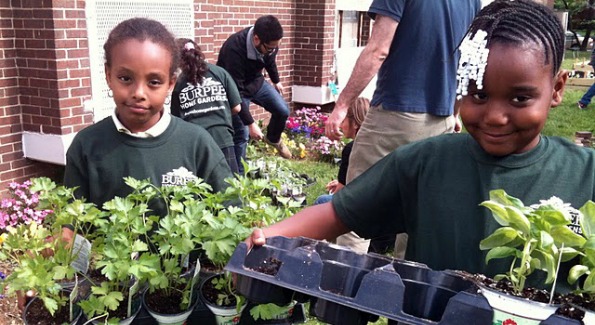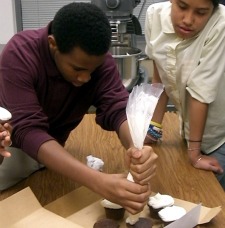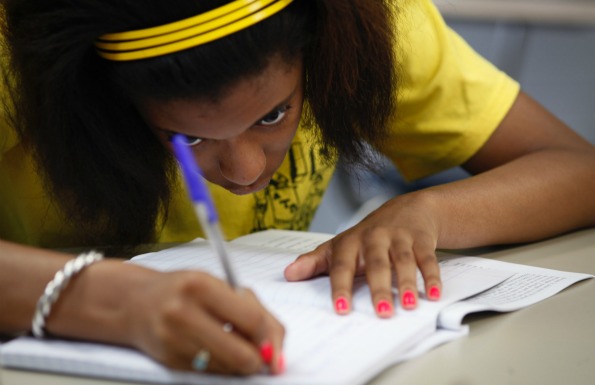Max Skolnik and his team meet the needs – and keep the interest – of DC youth.
By Kinne Chapin
Who have you known for ten years? For most people, the list would include family, a few friends, and perhaps an aging pet. But for Kid Power and Executive Director Max Skolnik, the list includes 10 of the 15 members of the nonprofit’s founding class. Kid Power believes in forming lasting relationships with young people — they meet with the 350 current members of their program every day after school, and many of the kids they work with return to Kid Power year after year.
Supporting their members so consistently allows Kid Power to play an integral role in each young person’s development. “It allows us to be a bridge between family life and school,” Skolnik explains. Because the Kid Power staff will know a child for longer than any individual teacher, their education and enrichment becomes a personal experience. Kid Power stays with its students from the time they enter third grade to the time they graduate high school.
How do Skolnik and his team keep 350 students spread over dozens of program sites interested each day? “We try to meet the kids at their needs and where their interests are,” Skolnik explains. Kid Power meets their participants’ needs through civic education and service-based learning, as well as through academic tutoring led by high school students from local private schools.
But meeting their participants’ interests receives just as much of Kid Power’s attention. The students get a chance to run their own businesses, Cookie Time and Veggie Time, which give them responsibility for the design and sale off the cookies and raising the vegetables in 20 garden beds across the city. Kid Power members even get the chance to decide how the profits from their business will be used—currently the proceeds go towards helping young people in South Africa.
But for Skolnik, finding each Kid Power student’s individual passion is crucial. He uses the example of Felicity, a member of their founding class, as an example. When she came to Kid Power, Felicity had a lot of energy—and she liked to use it to frustrate authority figures. Recognizing that Felicity needed a better way to use her fire, Kid Power encouraged her to try theatre. Soon she was starring in all of their productions. Though this example is inspiring, it is far from unique for Kid Power. As Skolnik explains, “I feel lucky and honored to be working with these kids because they have so much talent and so much heart and it’s bursting to come out—they just need an outlet.”
Quick Q&A with Max Skolnik
Washington Life: What is Kid Power’s mission?
Max Skolnik: We provide the provide the academic, civic, nutritional, and service learning tools for young people to become informed and engaged advocates for change in their own lives and in their communities.
WL: How was Kid Power founded?
MS: It was started in 2002, I was the co-founder with my business partner Caroline Sholl. It will be our tenth anniversary in the next six months—We’re having a whole bunch of events that will culminate with a big birthday celebration in June with a lot of our parents and kids. But we’re also doing a bake sale and a service day; it’s a season of birthday celebrations.
WL: How can the public get involved?
MS: We really have a ton of volunteer opportunities, and we have the ability to meet anyone’s particular need or commitment level. We have weekly academic tutoring opportunities where you can work one-on-one with a student and we have lot of programs where someone can come volunteer for cooking or baking for a service project. We also have a lot of special one-time events, we have season of service days every year. So we have a whole host of ways—whether you want to be a consistent volunteer or just come one or two times.
WL: What sets you apart from other Washington nonprofits?
MS: I think there are three areas we always talk about that make us unique. One is our really innovative curriculum, it’s a civics and service curriculum that we’ve developed in house with our staff and students and volunteers over the years. We have a variety of workbooks and curriculum materials that we’re constantly evaluating and building upon and creating new levels for. We try to match that with a really strong assessment program.
We are also very proud of our partnerships, we’re always looking for strong programs to partner with. We have a significant one with three private schools; the bulk of our students come from public and charter schools, but the bulk of our volunteers come from three private schools. We call it the Public-Private Partnership, and we’ve been doing it for going on ten years now.
The third aspect is we are really involved in a lot of youth advocacy. We don’t draw a line between direct level service and advocating for policy at a citywide level. Because we’re a civics based organization, because we want our kids to understand what their responsibilities are as a citizen, our kids are involved in pushing youth-friendly policies.
WL: Finish this sentence: “I want people in DC to know…”
How important out of school time programming is. Too often we get billed as babysitting or recreation, but it really is very intentional and very professional and driven by outcome. I think there is a lot of high quality work being done all over the city by a lot of great organizations that’s not being included in the education discussion because everyone assumes education happens within school walls. I want people to know that education happens 24 hours a day, every day of the year, and that we want to help make the most of that.



